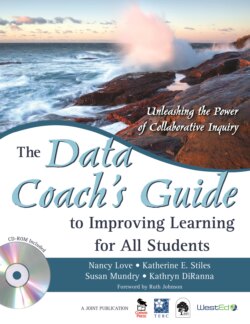Читать книгу The Data Coach's Guide to Improving Learning for All Students - Katherine E. Stiles - Страница 6
На сайте Литреса книга снята с продажи.
Foreword Unleashing the Power of Collaborative Inquiry
ОглавлениеRuth Johnson
This book offers a compelling message of hope and resolve. Love, Stiles, Mundry, and DiRanna’s three-year journey in a multiplicity of diverse, underperforming, high-poverty schools across the nation has resulted in a treasure chest of knowledge and experiences about how to professionally develop Data Coaches in ways that benefit some of our most underserved students.
Data analyses and use in schools and districts is generally limited to test scores. Teachers and principals rarely use data to understand the complexity of issues related to underachievement. The authors of The Data Coach’s Guide to Improving Learning for All Students: Unleashing the Power of Collaborative Inquiry recognize that simply telling busy school professionals that data helps to solve complex problems is insufficient and shortsighted. From the outset, the authors make clear that achievement gaps are not inevitable or immutable, and then they proceed to set forth data strategies that promise to close achievement gaps. They challenge the notion that underachievement rests only on the backs of students and their families. In its place, they have crafted a book that provides a model for professional development that counters notions of blame the victim. The text offers ways to assist schools to build cultures of inquiry that focus on equitable outcomes for students through the use of Data Coaches. The focus of the book is on preparing Data Coaches to work in diverse settings in a variety of our nation’s schools.
During the three-year grant period of the Using Data Project, the authors gained valuable insights on how to prepare Data Coaches to facilitate school inquiries. The work was based in project schools that served many African American, Latino/a, Native American, and students living in poverty. Through these field experiences, they learned critical lessons about leveraging data to raise student achievement, and they share an enormous amount of information. This book’s strategy of professionally developing Data Coaches is rooted in a goal of building institutional knowledge about conducting equitable inquiries. Educators who desire broad-scale improvement in student outcomes must embark on a challenging process of changing whole systems—and the cultures within them. The barriers to change—and the conditions that must be created to allow for change to take hold—are significant. But what must give us hope is that many schools have risen and continue to rise to these challenges, using data inquiries at every stage to inform their direction.
Collaborative inquiry is an approach that has the potential to authentically embrace and use the voices of the school community for improvement. This requires coaches to have skills for using data and, more important, the skills and dispositions to implement an equity agenda through the school communities’ use of data. The authors understand the power of data and how it leads to deeper levels of discovery—to see familiar things as you have never seen them before—and then to move to the next step when warranted, using the information to challenge and transform the status quo. This book aims to prepare Data Coaches who can work along with others to uncover practices that disenfranchise children and to use this information to change practice. These coaches must be ones who have the need to know about information that can be used for positive change.
The facilitation process set forth in this book engages potential Data Coaches in conducting culturally responsive inquiries. The authors discuss the critical issues that schools must surmount in order to turn around low-performing schools. This requires that coaches have an understanding of the processes needed to engage professionals in sensitive conversations and to raise issues about information that is often not uncovered and often not spoken about in schools. It requires coaches to have the skills to facilitate uncomfortable situations. It requires coaches who know how to deal with confrontations and disparate belief systems. This book provides many of the tools that coaches will need in these situations. The authors provide background literature, rich real-life case studies, and templates to guide activities. A very useful CD-ROM accompanies the text. This provides users with protocols, templates, PowerPoint slides, handouts, and a comprehensive Toolkit.
The Data Coach’s Guide to Improving Learning for All Students: Unleashing the Power of Collaborative Inquiry provides information for a wide range of audiences. It offers a variety of templates, literature, and processes for professional development. In the end, we know that this book in and of itself cannot create equitable schools. Merely learning to manipulate information and being trained in how to facilitate collaborative inquiry can result in a series of symbolic events if one does not bring the vision, passion, and a belief about what is possible for all children. What this book can do is provide powerful resources to those who have the belief, passion, and desire for rich resources for implementing collaborative data inquiries in schools and districts.
